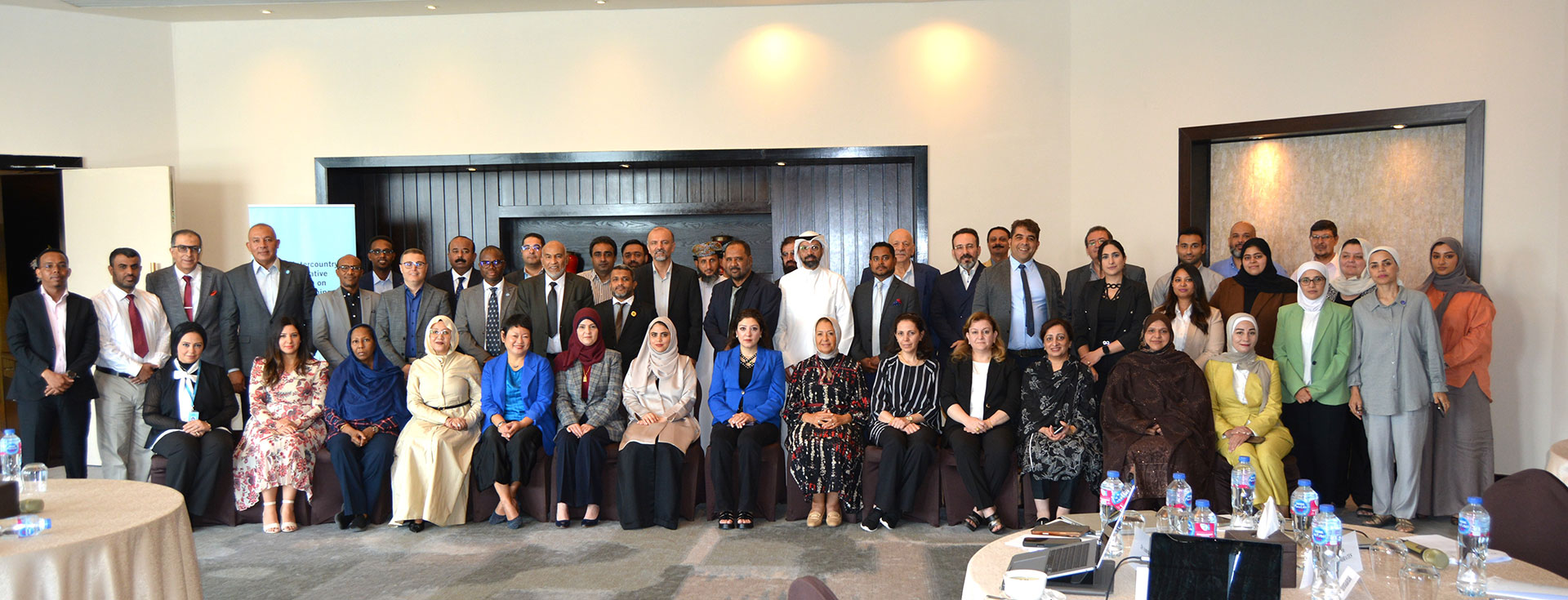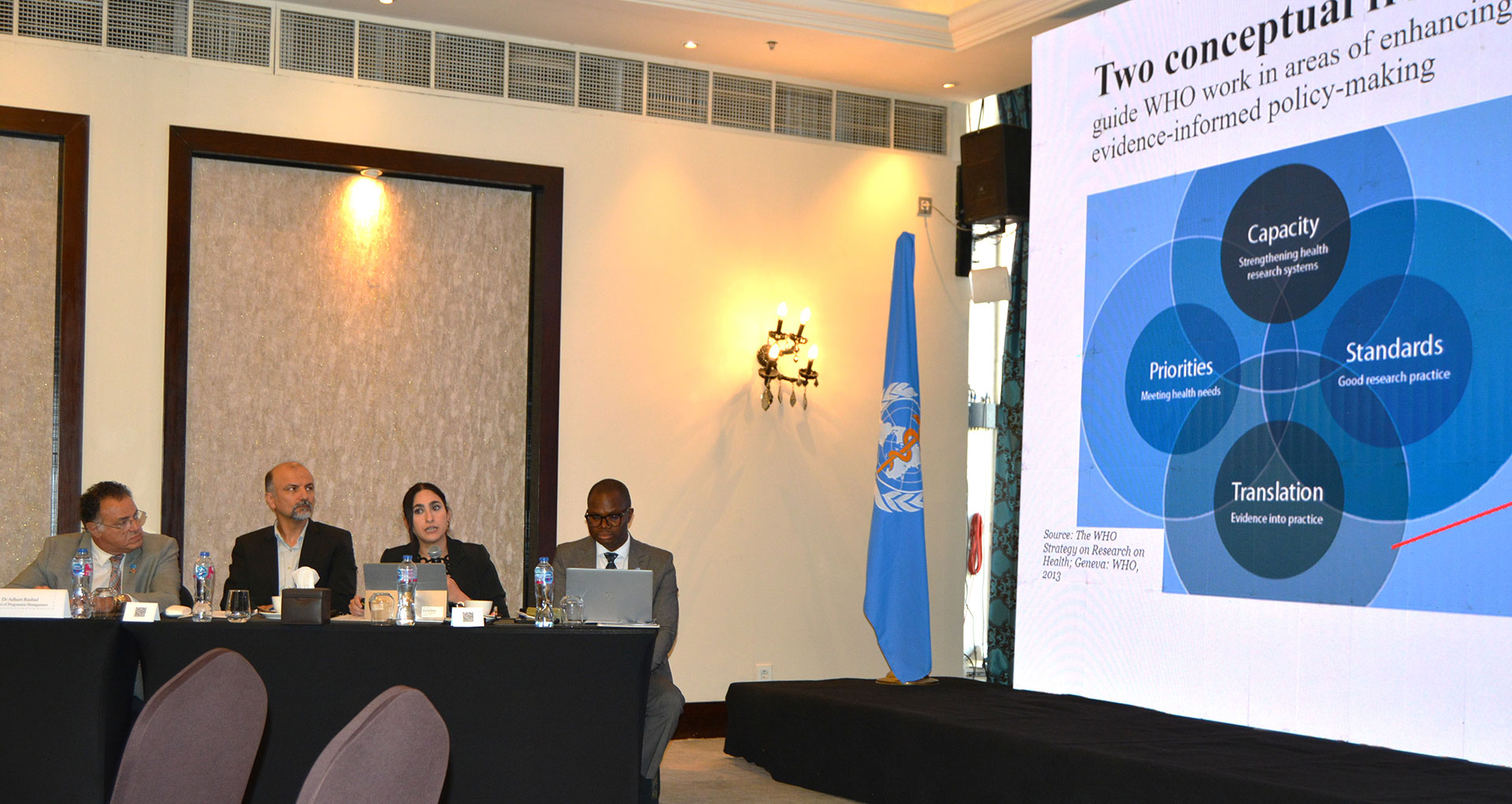16 November 2025, Cairo, Egypt – The Department of Science, Information and Dissemination at the World Health Organization (WHO) Regional Office for the Eastern Mediterranean convened a 5-day intercountry consultative meeting to advance the generation, governance and use of data and research evidence for health decision-making across the Region.
The intercountry meeting, which ran from 31 August to 4 September, was inaugurated by Dr Arash Rashidian, Director of the Science, Information and Dissemination Department at the Regional Office. The event brought together over 100 participants from ministries of health, academic institutions and international organizations to strengthen collaboration around 3 interlinked areas of work – improving national health information systems, institutionalizing evidence-informed policy-making and enhancing national clinical trial ecosystems.
Reviewing health data through SCORE assessments
The first 2 days focused on strengthening health information systems using WHO’s SCORE for Health Data Technical Package. Experts from WHO and ministries of health presented preliminary global and regional results from the second round of SCORE assessments for countries in the Region. Participants discussed strategies to improve the quality of civil registration and vital statistics, optimize health service data and enable greater use of information in policy and planning.
 Experts and participants gather for a group photo during the "Enhancing national information systems for health through a review of SCORE assessments’ findings" event.
Experts and participants gather for a group photo during the "Enhancing national information systems for health through a review of SCORE assessments’ findings" event.
Building capacity for health policy and systems research and evidence-informed policy-making
From 1 to 2 September, sessions focused on strengthening the institutional capacity for health policy and systems research and promoting the uptake of evidence in national decision-making. WHO presented practical tools, including the Rapid Advice Tool, to help countries adapt the regional action plan for evidence-informed policy-making to their national contexts. Ministries of health from countries in the Region and academic and research institutions shared their experiences in bridging the gap between research and policy. Discussions highlighted the role of the Regional Network of Institutions for Evidence and Data to Policy (NEDtP) and the transformative potential of artificial intelligence in evidence synthesis and decision-making.
Strengthening capacity and governance for large-scale clinical studies
The final 2 days of the consultation addressed the need to build robust national ecosystems for clinical trials and large-scale studies. Following the launch of the Arabic version of WHO’s Guidance for best practices for clinical trials, participants discussed the maturity of clinical trial systems in the Region, ethical governance and regulatory oversight. Panel discussions with national regulatory authorities in the Region emphasized the importance of harmonized processes, ethics review, community engagement and digital innovations in advancing high-quality, equitable clinical research.
Development partner’s meeting: a united call for action
On 1 September, as part of the 5-day event, the Regional Office hosted a development partners’ meeting to align governments, international organizations, academia, civil society and youth networks on strengthening evidence ecosystems in the Region.
 Seated from left to right are Dr Adham Ismail (Director of Programme Management), Dr Arash Rashidian (Director of Science, Information and Dissemination), Dr Mehrnaz Kheirandish (Regional Adviser for Evidence and Data to Policy, Regional Advisor a.i., Research Promotion and Governance) and Dr Henry Doctor (Coordinator, Information Systems for Health), during the Development Partners’ Meeting.
Seated from left to right are Dr Adham Ismail (Director of Programme Management), Dr Arash Rashidian (Director of Science, Information and Dissemination), Dr Mehrnaz Kheirandish (Regional Adviser for Evidence and Data to Policy, Regional Advisor a.i., Research Promotion and Governance) and Dr Henry Doctor (Coordinator, Information Systems for Health), during the Development Partners’ Meeting.
In his opening remarks, Regional Office Director of Programme Management Dr Adham Ismail emphasized that in times of financial constraints, decisions must focus on country priorities and be guided by evidence. Regional priorities in health information systems, evidence-to-policy processes and clinical trial readiness were also discussed.
Partners called for stronger collaboration on cybersecurity, scalable digital health solutions and the creation of a clinical research network. The need for greater inclusion of young health professionals in research, AI initiatives and medical education reform was also highlighted.
Closing the meeting, WHO reaffirmed that partnerships and alliances are crucial to ensuring that every decision is based on knowledge and every investment delivers measurable health impact.
A roadmap for stronger, evidence-based health systems
The consultation concluded with a shared commitment to improve the quality of health data, embed evidence-informed approaches in national policies and strengthen governance and capacity for clinical research. The outcomes form a clear roadmap for countries and will guide WHO’s continued support, serving as essential components in furthering the achievement of universal health coverage and the health-related Sustainable Development Goals.








